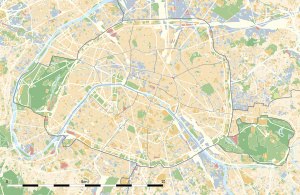You can help expand this article with text translated from the corresponding article in French. (December 2009) Click for important translation instructions.
|
 By Eugène Atget, Sainte-Pélagie prison in 1898, destroyed in May 1899. By Eugène Atget, Sainte-Pélagie prison in 1898, destroyed in May 1899. | |
 | |
| Location | 5th arrondissement of Paris |
|---|---|
| Coordinates | 48°50′33″N 2°21′10″E / 48.842581°N 2.352720°E / 48.842581; 2.352720 |
| Status | Demolished |
| Opened | 1790 |
| Closed | May 1899 |
| Street address | No. 56 Rue de la Clef and Rue du Puits-de-l'Ermite |
| City | Paris |
| Country | France |
| Notable prisoners | |
Sainte-Pélagie was a prison in Paris, in active use from 1790 to 1899. It was founded earlier than that, however, in 1662, as place for "repentant girls" and later "debauched women and girls." The former Parisian prison was located between the current group of buildings bearing No. 56 Rue de la Clef with Rue du Puits-de-l'Ermite in the 5th arrondissement of Paris at the old Place Sainte-Pélagie.
The penal structure held many noted prisoners during the French Revolution, with Madame Roland, Grace Dalrymple Elliott and Marie-Louise O'Murphy being among the known prisoners. After the revolution, the Marquis de Sade was imprisoned here, as was the young mathematician Évariste Galois. During the July Monarchy, the "April insurgees" were also detained there, and some managed to escape through a tunnel. The painter Gustave Courbet was also imprisoned here for his activities in the Paris Commune. He painted a self-portrait titled, Gustave Courbet: Self-Portrait at Sainte-Pélagie.
See also
References
- Hopkins, Tighe (1897). "The Dungeons of Old Paris: Being the Story and Romance of the Most Celebrated Prisons of the Monarchy and the Revolution". G.P. Putnam's Sons. pp. 131–154. OCLC 371224.
- Hopkins, Tighe (1897). "The Dungeons of Old Paris: Being the Story and Romance of the Most Celebrated Prisons of the Monarchy and the Revolution". Internet Archive. G.P. Putnam's Sons. pp. 131–154. OCLC 371224.
- Vause, Erika (2018). In the Red and in the Black: Debt, Dishonor, and the Law in France between Revolutions. University of Virginia Press. ISBN 978-0813941424. OCLC 1011613926.
External links
 Media related to Prison Sainte-Pélagie at Wikimedia Commons
Media related to Prison Sainte-Pélagie at Wikimedia Commons Media related to Rue de la Clef (Paris) at Wikimedia Commons
Media related to Rue de la Clef (Paris) at Wikimedia Commons Media related to Rue du Puits-de-l'Ermite (Paris) at Wikimedia Commons
Media related to Rue du Puits-de-l'Ermite (Paris) at Wikimedia Commons
This article about a French building or structure is a stub. You can help Misplaced Pages by expanding it. |
This prison-related article is a stub. You can help Misplaced Pages by expanding it. |